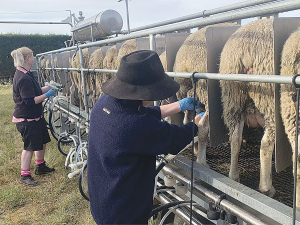Long-term wool grower turns to milking sheep
Joe Catherwood has been a client of PGG Wrightson Wool throughout his farming career.
 Canterbury sheep farmer and woolgrower Joe Catherwood has diversified into sheep milking. Photo Credit: Kim Lewis.
Canterbury sheep farmer and woolgrower Joe Catherwood has diversified into sheep milking. Photo Credit: Kim Lewis.
Long-time Canterbury sheep farmer and woolgrower Joe Catherwood has diversified into sheep milking.
Catherwood farms 320 hectares at Charing Cross, Central Canterbury. Until a few years ago the farm only carried sheep. However, when irrigation from the Central Plains Water scheme became available, it also began growing crops and now milking sheep.
“When the irrigation scheme was built we needed to pay for it, so I needed to increase my returns,” Catherwood explained. “I’ve always kept a few pet lambs, and in 2017 started milking some of my ewes, freezing their milk to feed to the following year’s pet lambs.”
Originally the plan was to milk 50 odd sheep, but seven years later his mob of milking ewes now numbers almost 1000. For the last three seasons he has been supplying Kirwee based Sheep Milk NZ.
“What we do is still conventional farming,” Catherwood adds. “I want ewes to raise fat lambs, big enough to send away in November. We aim to gross around $500 per ewe: producing 1.5 lambs each, feed and wean the lambs, then we milk the ewes for around 100 days to increase those returns.”
Unlike many other sheep milk operations, Catherwood leaves his lambs with the ewes until weaned, or heavy enough to kill at 17 to 18 kilograms.
“Some farmers take the lambs off after three days, giving the ewes around 200 days in milk,” he says.
“If you hand rear the lambs, you have to buy in milk powder, then you struggle to put enough condition on your lambs to send them away by December. With the milk genetics in the ewes, raising robust lambs is also more difficult. I prefer not to complicate it.”
Experimenting with genetics has helped increase Catherwood’s milk production.
“East Friesian is the standard breed for milking sheep overseas, though they are scatty and not that easy to deal with,” he adds. “I have created a Catherwood Cross by putting some Texel, Romney, Poll Dorset and Composite breeds across the flock to give them a bit more condition.”
His Catherwood Cross milking ewes have good udder conformation, are hardy and produce a fat lamb. He believes that an easy milking sheep needs a bare belly, a bare udder and a bare rear end.
However, Catherwood warns that going too far with the shedding genetics can compromise the wool.
“We still want wool, though we also like the sheep nice and clean underneath, making them easier to milk.”
To help milk his flock, Catherwood calls in LM, who also owns Almae Sheep Stud, plus his farm manager Dudley Cridge. Both are keen advocates of sheep milk.
“Farming sheep is gentler on the environment than a dairy farm, with less nitrogen leeching and greenhouse gas emissions,” LM explains.
“When a sheep pees, it doesn’t create a urine patch the way a cow does, so unlike a dairy cow, the nitrogen doesn’t go through to the ground water. One litre of sheep milk accounts for around one third of the carbon footprint of the same quantity of cow milk.”
She adds that AgResearch research has found that sheep genetics associated with low methane production correspond to higher productivity for both meat and milk. Scanning suggests this is due to the composition of the rumen in animals with those favourable genetics, so you can breed for a better producing sheep that also has a lower environmental impact.
Agrisea NZ has appointed Craig Hudson as it's new chief growth officer.
State farmer Landcorp, trading as Pamu, is a forecasting a full-year net profit of around $100 million.
Tony Aitken, chief executive of Ruralco, has been awarded the Excellence in Business Leadership Award at the ANZ Business of the Year Awards.
Global trade has been thrown into another bout of uncertainty following the overnight ruling by US Supreme Court, striking down President Donald Trump's decision to impose additional tariffs on trading partners.
Controls on the movement of fruit and vegetables in the Auckland suburb of Mt Roskill have been lifted.
Fonterra farmer shareholders and unit holders are in line for another payment in April.